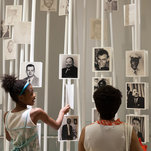BEIRUT, Lebanon — For the second day in a row, deserters from the Syrian Army carried out attacks on symbols of the Assad government’s centers of power, targeting the youth offices of the ruling Baath Party on Thursday after firing rocket-propelled grenades on a military intelligence base on Wednesday, activists said.
Armed Groups Are on Rise in Syria, as Are Civil War Fears
By NADA BAKRI
Published: November 17, 2011
Related in Opinion
-
Op-Ed Contributor: Do Not Attack Syria (November 19, 2011)
-
Op-Ed Contributor: The Devil We Knew (November 19, 2011)
-
Room for Debate: Why Turkey Turned Away From Syria (November 15, 2011)
Connect With Us on Twitter
Follow @nytimesworld for international breaking news and headlines.
The attacks, along with fraying relations among Syria’s religious communities, growing international pressure and a relentless crackdown, prompted Russia, Syria’s closest ally, to say that the country was moving closer to a civil war.
The attacks may have been more symbolic than effective, but could mark the increased ability of a growing number of defectors to publicize their exploits. Attacks on government installations — in the southern town of Dara’a and the central city of Homs, for instance — have been reported since the start of the uprising.
The attacks themselves paled before the bloodiest episodes of Syria’s last uprising in the late 1970s and early 1980s. Then, insurgents stormed the office of the Aleppo Artillery School, killing 32 cadets. It was unclear whether anyone was killed or wounded in these attacks, but the constituency of armed strikes and the bold choice of targets has heightened the profile of Syria’s armed insurgency.
The Syrian government did not mention either attack, which activists reported, citing the accounts of local residents. But even without a firm picture of any damage, the attacks were, at a minimum, indicative of determination on the part of military defectors in the face of a crackdown that the United Nations says has killed more than 3,500 people.
Army desertions — which have been reported since the start of the uprising and may now number in the thousands — have yet to undermine the unity of Syria’s military. But the continued flow increases the pool of recruits for the armed defector groups. And some analysts said the defections might be increasing as Syria’s last remaining allies peel away, including the Arab League, which has threatened to suspend Syria’s membership in coming days if it does not abide by its call to stop the killing.
“It’s a huge boost to whoever wants to stand against the regime, both on a military level and on the level of civilians,” said Hussein Shobokshi, a columnist with Asharq al-Awsat, a Saudi-owned newspaper published in London. “This regime has expired, and the move will set the round for further defections, civilian protests and maybe even military intervention. It will also allow the international community to take further action like creating safe haven or no-fly zones.”
There is no unified opposition driving events in Syria. Many of the leaders calling for the downfall of the government have voiced concerns over the attacks and warned that they could lead to internal strife, similar to what happened in Syria’s neighbors Lebanon and Iraq.
“I am opposed to internal fighting; the people of one country should not kill each other,” said Fayez Sara, an influential opposition figure in Damascus. “The operations against government forces should stop.”
On Thursday, the civilian toll continued to mount. The Local Coordination Committees, an opposition group, said at least 19 people had been killed across Syria, including four army defectors, seven civilians and two minors.
In Moscow, Foreign Minister Sergey V. Lavrov said that the international community should call on all sides in Syria to stop the bloodshed. “There are more and more weapons that are being smuggled in from neighboring countries,” Mr. Lavrov said. “Today I saw a television report about some new so-called rebel Free Syrian Army organizing an attack on the government building, on the building belonging to Syria’s armed forces.”
“This was quite similar to a true civil war,” he added.
In Turkey, once Syria’s ally and now a sharp critic, Prime Minister Recep Tayyip Erdogan denounced the lack of effective action against the Damascus government, questioning whether international players were ignoring the bloodshed because the country offered no precious resources.
“Syria might not be generating the level of reactions seen in Libya because it does not have that much petrol,” Mr. Erdogan said in a televised speech at the Black Sea Economic Cooperation Summit in Istanbul. “However, I would like you to know that those who are killed in Syria are as human and living souls as those who died in Libya.”
At the United Nations, Germany, France and Britain were circulating a draft General Assembly resolution endorsing the Arab League-brokered peace plan calling on Syria to halt all violence and withdraw armed forces from civilian areas, moving to further quarantine Syria internationally as well as in the Arab world. Several Arab countries expressed interest in helping to sponsor the measure, the German mission said in a statement.
The Syrian Observatory for Human Rights, an opposition group operating in exile, said that armed fighters believed to be members of the Syrian Free Army launched an attack with rocket-propelled grenades on a building housing the youth offices for the Baath Party in the city of Maarat al-Noaman in the northwestern province of Idlib. The group said clashes ensued between the fighters and security forces who were outside the building.
Abo Moayed, an activist from Idlib who said that he was in contact with fighters, said that the attack was launched after receiving signals from soldiers inside the building. “Around 250 fighters participated in this attack. And after the attack, 60 soldiers who were in the building defected and left the town.”
There was no way to independently verify his account.
The attack on the intelligence installation, in the Harasta suburb of Damascus, was one of several clashes claimed Wednesday by the Free Syrian Army. But at the time, the Local Coordination Committees said the attack was most probably an act of vengeance by protesters who were imprisoned and interrogated there. Another group said only two rocket-propelled grenades were fired at the building, and there was no apparent damage.
Omar Idlibi, an activist with the Local Coordination Committees, said that at least two dozen soldiers had left their ranks in the city of Hama on Thursday.
In October, the Security Council failed to pass a toothless resolution condemning the violence, in the face of a rare veto by both Russia and China. A nonbinding General Assembly resolution in support of the Arab League demands would carry even less weight.
But since all 193 member states can vote, the outcome would reflect global opinion. Syria, already embarrassed that its Arab credentials are being questioned, has also long put stock in the General Assembly as reflecting international legal opinion over issues important to it, particularly the return of the Golan Heights by Israel.
“We hope it will show Assad just how isolated he is,” Peter Wittig, Germany’s representative to the United Nations, said in a statement.









